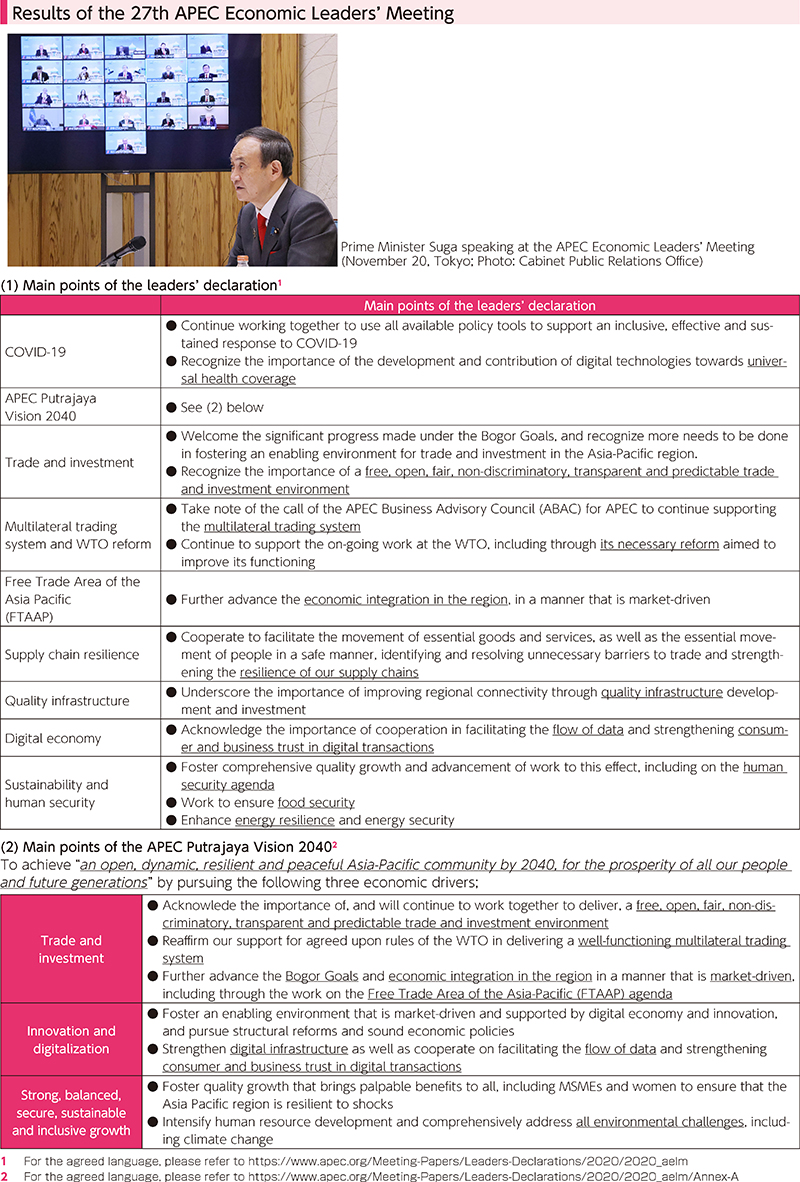Diplomatic Bluebook 2021
Chapter 3
Japan's Economic Diplomacy to Promote National and Global Interests
2 Asia-Pacific Economic Cooperation (APEC)
APEC is a framework of economic cooperation in which 21 economies (countries and regions)1 in the Asia-Pacific region participate. The Asia-Pacific region is the “world's growth center,” accounting for about 40% of the world's population, about 50% of the world's trade volume, and about 60% of the world's total GDP. APEC, in order to liberalize and facilitate trade and investment in the region, conducts activities such as deepening regional economic integration, and enhancing economic and technical cooperation. The Asia-Pacific region, which thrives by liberalizing trade and investment and strengthening connectivity in accordance with international rules, is the core of the “Free and Open Indo-Pacific” that Japan has been promoting. Japan's active involvement in and promotion of cooperation with APEC are of great significance to the effort to support our own economic growth and the overseas expansion of Japanese companies.
At APEC 2020, chaired by Malaysia, discussions were held at a variety of meetings throughout the year (all meetings beginning in March were held virtually). The discussions revolved around an overarching theme ─ “Optimizing Human Potential Towards a Resilient Future of Shared Prosperity. Pivot. Prioritise. Progress.” ─ as well as three priority areas; (1) improving the narrative of trade and investment, (2) inclusive economic participation through digital economies and technologies, and (3) driving innovative sustainability.
The 27th APEC Economic Leaders' Meeting held on November 20 as APEC's first ever virtual meeting, highlighted the presence of APEC in the Asia-Pacific region, adopting the Leaders' Declaration for the first time in three years, as well as the APEC Putrajaya Vision 2040, which charts a future course for APEC replacing the Bogor Goals.2 APEC Putrajaya Vision 2040 seeks to achieve an “open, dynamic, resilient and peaceful Asia-Pacific community by 2040, for the prosperity of all our people and future generations,” through the economic drivers of trade and investment, innovation and digitalization, and strong, balanced, secure, sustainable and inclusive growth.
At the Leaders' Meeting, Prime Minister Suga gave a keynote address on economic growth in the COVID-19 years and post-COVID-19 era, emphasizing the importance of realizing digitization and a decarbonized society, promoting free trade and strengthening connectivity, and achieving inclusive economic growth. Specifically, Prime Minister Suga highlighted the establishment of the government agency in charge of digital transformation and the acceleration of the virtuous cycle of environment and growth toward achieving carbon neutrality by 2050. He also explained Japan's intention to promote WTO reform, further advance regional economic integration toward achieving the Free Trade Area of the Asia-Pacific (FTAAP), strengthen connectivity by leading efforts to make the supply chain more resilient while distributing and deploying quality infrastructure, and ramp up efforts based on the concept of human security. New Zealand will serve as the host of APEC in 2021.

- 1 Members of APEC are referred to as ‘member economies' or ‘members' or ‘economies.'
- 2 A set of targeted goals for developed economies and developing economies to achieve free and open trade and investment no later than 2010 and 2020 respectively. Adopted at the 1994 APEC Economic Leaders' Meeting.
